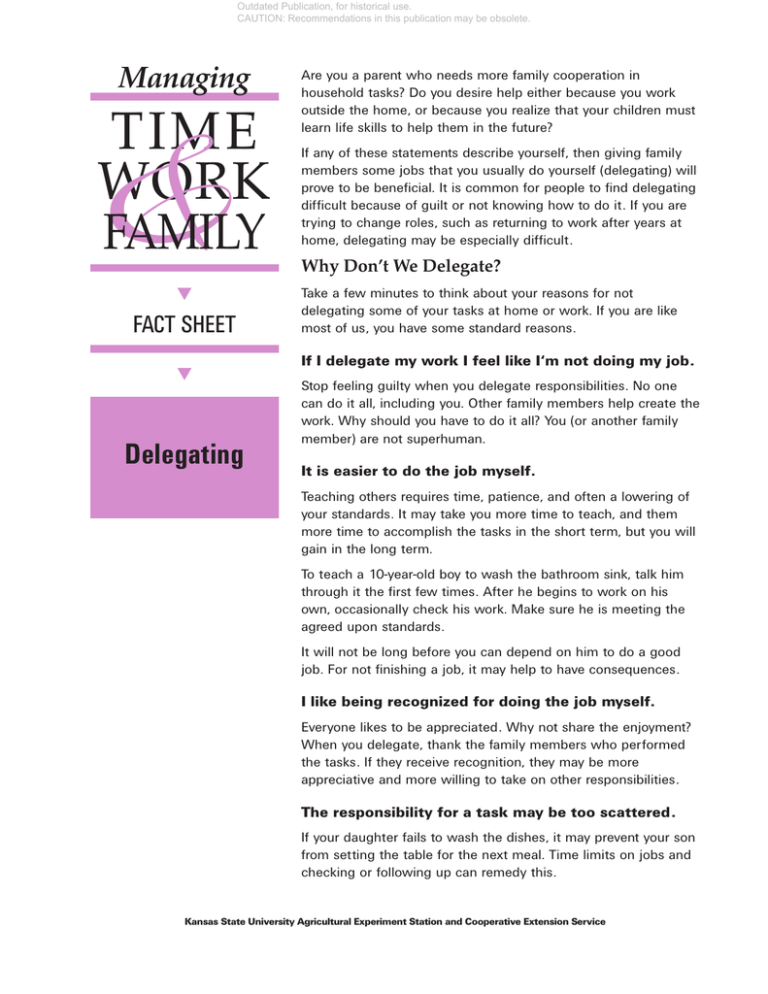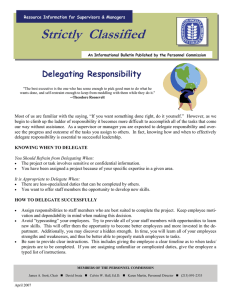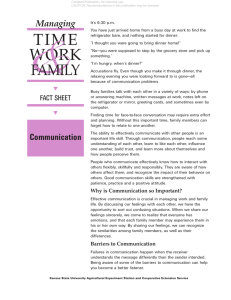
Outdated Publication, for historical use.
CAUTION: Recommendations in this publication may be obsolete.
Managing
TIME
WORK
FAMILY
&
▼
FACT SHEET
▼
Delegating
Are you a parent who needs more family cooperation in
household tasks? Do you desire help either because you work
outside the home, or because you realize that your children must
learn life skills to help them in the future?
If any of these statements describe yourself, then giving family
members some jobs that you usually do yourself (delegating) will
prove to be beneficial. It is common for people to find delegating
difficult because of guilt or not knowing how to do it. If you are
trying to change roles, such as returning to work after years at
home, delegating may be especially difficult.
Why Don’t We Delegate?
Take a few minutes to think about your reasons for not
delegating some of your tasks at home or work. If you are like
most of us, you have some standard reasons.
If I delegate my work I feel like I‘m not doing my job.
Stop feeling guilty when you delegate responsibilities. No one
can do it all, including you. Other family members help create the
work. Why should you have to do it all? You (or another family
member) are not superhuman.
It is easier to do the job myself.
Teaching others requires time, patience, and often a lowering of
your standards. It may take you more time to teach, and them
more time to accomplish the tasks in the short term, but you will
gain in the long term.
To teach a 10-year-old boy to wash the bathroom sink, talk him
through it the first few times. After he begins to work on his
own, occasionally check his work. Make sure he is meeting the
agreed upon standards.
It will not be long before you can depend on him to do a good
job. For not finishing a job, it may help to have consequences.
I like being recognized for doing the job myself.
Everyone likes to be appreciated. Why not share the enjoyment?
When you delegate, thank the family members who performed
the tasks. If they receive recognition, they may be more
appreciative and more willing to take on other responsibilities.
The responsibility for a task may be too scattered.
If your daughter fails to wash the dishes, it may prevent your son
from setting the table for the next meal. Time limits on jobs and
checking or following up can remedy this.
1
Kansas State University Agricultural Experiment Station and Cooperative Extension Service
Outdated Publication, for historical use.
CAUTION: Recommendations in this publication may be obsolete.
Why Should We Delegate?
There are many long-term advantages to delegating. These
advantages will benefit both you and the persons you delegate to.
You ease the workload on yourself.
This is not an immediate advantage, but you will see it soon. Do
not redo a delegated job even if it was not performed to your
standards. If the windows are streaked or the bathroom sink still
has toothpaste in it, re-train and work to lower your standards to
match ability levels.
You teach someone else skills and responsibilities.
Family members will benefit from the skills and responsibilities
they develop—immediately and in the future. Children develop
self-confidence when they learn new skills and are expected to be
responsible. Your son will think highly of himself when he knows
how and is also expected to make his bed, fold towels, and feed
the dog.
If you are gone or in bed with an illness, the family will know how
to do things. Your daughter will be proud that she can fix a
simple lunch for the family. However, sons should also know how
to make lunch.
Sons and daughters need to know how to do all household tasks.
When they leave to live in an apartment or dormitory, they will
understand why they needed to know how to do these tasks.
It is easier to schedule tasks.
When chores are divided among busy family members, things get
done on time more often. For example, the first person home in
the afternoon can be responsible for starting dinner preparations.
This saves mom from having to do it all when she gets home.
Tips for Effective Delegation
Share decision-making.
Call the family together, make a list of things that need to be
done, and discuss who will do them. One child may prefer
dusting the furniture, while another prefers vacuuming the carpet.
Let the person who is responsible for a task have input on how
and when the job is done. For example, if your spouse will be
doing the grocery shopping, keep his or her schedule in mind
when you set a shopping time.
Family members who feel that they have some influence in
decision-making are likely to be more responsible.
2
Outdated Publication, for historical use.
CAUTION: Recommendations in this publication may be obsolete.
Choose the right people for the right job.
Younger children may not be able to lift trash bags, but they can
empty wastebaskets.
Train thoroughly.
While vacuuming the floor, you may need to stay with your son
or daughter several times to instruct them on the proper
technique.
Define responsibilities clearly and set deadlines.
Discuss what is expected, and set deadlines for finishing the
tasks. For example, washing dishes includes cleaning the
counters and sinks, and the tasks must be done before television
can be watched. It may help to write out the responsibilities and
deadlines.
Set performance standards.
Accept the fact that you may need to change or adapt your
standards. The towels may not be folded neatly, but do not redo
the job. Re-train until you see that your child has done his or her
best. A child’s ability will improve with time.
Help children see how their part fits
in with the complete task.
If your daughter is peeling potatoes for mashed potatoes, let her
observe or occasionally mash the potatoes after they are cooked.
Let go of authority.
When others become more capable, let them be in charge. As
the one in charge of laundry, your daughter may forget to put
soap in the wash load. Experiencing that mistake herself will
teach your daughter more than if you are constantly watching
over her to prevent mistakes.
Remember to say, "Thank you."
After a job is done, acknowledge each person’s
accomplishments! Make sure you commend and encourage
family members as they learn their new responsibilities.
Notice when your son makes his bed well and praise his actions.
Do not comment only when mistakes are made, such as when
the bedspread is crooked or when the sheets are wrinkled
underneath.
3
Outdated Publication, for historical use.
CAUTION: Recommendations in this publication may be obsolete.
Ask yourself if there are things that you can stop
doing or can do monthly or weekly.
Grocery shopping may be done less often if you plan ahead.
Washing the kitchen floor can be done once or twice a week,
instead of every day, if you need time for other things and can
lower your standards. No one else will probably notice if you do
certain jobs less often.
Conclusion
DEVELOPED BY THE “MANAGING
TIME, WORK AND FAMILY” TEAM:
Katey Walker, Extension Specialist, Family
You may find that delegation of home tasks is difficult to begin,
but you will find many advantages in sharing household
responsibilities.
Resources & Public Policy
Emily Mark,
Extension Specialist, Family &
Consumer Sciences, Northeast
Laurie Chandler, CED, Shawnee Co.
Fran Richmond, CEA, FACS, Osage Co.
Denise Sullivan, CEA, FACS, Leavenworth Co.
and Support Staff
Parents will be satisfied because they will have more time for
other interests and will have a smooth-running household. They
also know that their children are becoming better prepared for
future life. Children will benefit by increasing their self-confidence
and developing many life skills.
Sharing decision-making, thorough training and follow-up, setting
performance standards, and keeping individual abilities in mind
are all ways to help delegate work in your family.
Contents of this publication may be freely reproduced for educational purposes. All other rights are reserved. In each case, credit Emily Mark & Katey Walker, “Managing Time, Work & Family,”
Kansas State University, December 1997.
Kansas State University Agricultural Experiment Station and Cooperative Extension Service, Manhattan, Kansas
MF-2255
December 1997
Issued in furtherance of Cooperative Extension Work, acts of May 8 and June 30, 1914, as amended. Kansas State University, County Extension Councils, Extension Districts, and United States
Department of Agriculture Cooperating, Richard D. Wootton, Associate Director.
It is the policy of Kansas State University Agricultural Experiment Station and Cooperative Extension Service that all persons shall have equal opportunity and access to its educational programs,
services, activities, and materials without regard to race, color, religion, national origin, sex, age or disability. Kansas State University is an Affirmative Action employer. These materials may be
available in alternative formats.
File Code: Family Resource Management—4
CS 12/97—150
4








